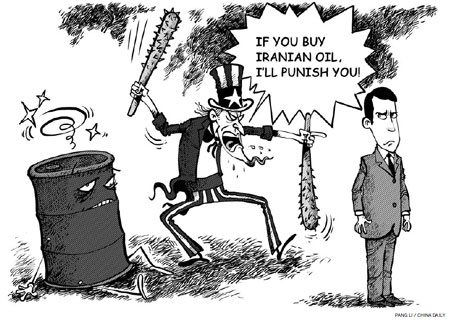With space for diplomatic solution to nuclear issue narrowing, hopes for peace are pinned on forthcoming talks with Iran
It seems to be a consensus of the US Republican and Democratic parties that the Iran nuclear issue is the most pressing diplomatic concern for the United States at the moment. The George W. Bush administration openly regarded Iran as the country that posed the severest challenge to the US, and although the Obama administration has not come out and publicly said so, it seems to be following the same line.
However, Iran has repeatedly stressed that it is not seeking to own nuclear weapons and Iran's supreme leader Ayatollah Ali Khamenei has said nuclear weapons do not conform to the doctrine of Islam. Iran believes that blaming its nuclear program is only an excuse for the West, especially the US, to overthrow its regime, and it should not be deprived of its right to engage in nuclear energy research and development.
Yet the US and Israel still claim they believe the purpose of Iran's nuclear program is to own nuclear weapons and that if Iran becomes a nuclear power, then nuclear competition in the Middle East will be unavoidable, leading to the collapse of the international nuclear non-proliferation system, a nightmare for the US.
At the instigation of the US, the UN Security Council has passed several resolutions imposing sanctions on Iran. Moreover, the bill signed into law by US President Barack Obama on Dec 31 last year, which requires countries demonstrate they have "significantly reduced" the volume of crude oil purchased from Iran or else face sanctions themselves, strikes not only at the Iranian government but at the Iranian people as their economy worsens.
Oil exports contribute 80 percent of Iran's foreign exchange reserve and 50 percent of its state budget, and Iran is feeling the pinch. The riyal has already depreciated 40 percent.
However, the Iran nuclear issue still presents the Obama administration with several challenges.
First, have the new sanctions already yielded expected results? Iran's oil exports have indeed declined to a historical low because of the sanctions. But they are hurting people in other countries as well. India and China, still the largest importers of oil from Iran, both have their own interests involved and neither is an ally with the US, so the two countries hope to maintain normal trade relations with Iran for the health of their own economies.
Second, the deteriorating economic situation in Iran caused by sanctions may lead the Iranian people's rising discontent with their government to turn instead to virulent anti-US and anti-EU sentiment. The recent parliamentary elections in Iran showed that there is still strong cohesion around the hard-line conservative party represented by Khamenei.
Third, the Republicans are using Obama's reluctance to order military strikes against Iran as a means of attacking his administration in the run-up to the US presidential election. The Republicans are quite vocal about their willingness to use military force in Iran and some Republican presidential candidates have even accused Obama of being "too weak" on Iran.
Obama has responded by criticizing the Republicans' proposal as irresponsible. But the Republican contenders for the November presidential election will continue to add to the pressure of the Iran nuclear issue.
Meanwhile, the Obama administration is exerting further pressure on Iran, saying that all options are being considered and the space for diplomatic solution is becoming narrower.
Fourth, will Israel strike against Iran? Israeli Prime Minister Benjamin Netanyahu urged the US to take action against Iran during his visit to the US in March. He said sanctions won't work and emphasized that Israel can make its own autonomous decisions and it will not stand idly by and let Iran arm itself with nuclear weapons. So it remains to be seen to what extent the US can influence Israel and what the US will do to prevent Israel from plunging the region into another war by launching military strikes against Iran.
Amid all these uncertainties, all sides are hoping for new initiatives to emerge from the forthcoming negotiations between China, France, Germany, Russia, the United Kingdom, the United States and Iran.
The author is a researcher with the Institute of American Studies under the Chinese Academy of Social Sciences.

(China Daily 03/23/2012 page8)